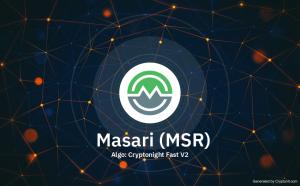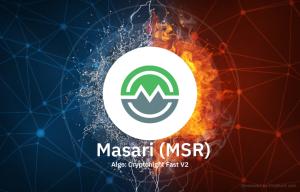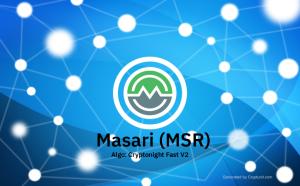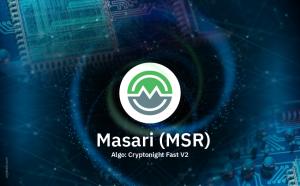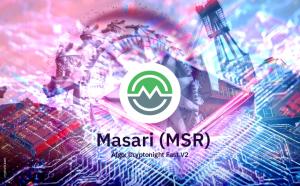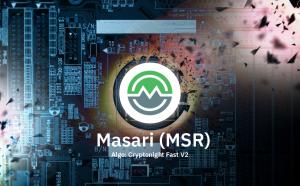Masari (MSR)
$0
(0%)
0 BTC
0 Mh/s
Hashrate
$0
0 BTC
0 MSR
Last reward
12/5
Miners/Pools
| POOL MINING | DAY Current Diff |
DAY 1h AVG Diff |
DAY 24h AVG Diff |
WEEK 24h AVG Diff |
MONTH 24h AVG Diff |
|---|
| SOLO MINING | DAY Current Diff |
DAY 1h AVG Diff |
DAY 24h AVG Diff |
WEEK 24h AVG Diff |
MONTH 24h AVG Diff |
|---|
Masari mining pools
| Pool Name | Merged | Fee % | Min Pay | Miners | Mh/s | Status | ||
|---|---|---|---|---|---|---|---|---|
| Hashvault | pplns 0.9 | 0.1 | 0 | 0 | 9 min ago | |||
| Fastpool.xyz | 0.8 | 0.5 | 0 | 0 | 3 min ago | |||
| c3pool.com | 0.005 | 1 | 0.000053 | 6 m ago | ||||
| Pool-pay.com | 0 | 9 | 2 | 0.012 | 12 min ago | |||
| Monero Ocean | pplns 0 | 0.003XMR | 9 | 0.15 | 6 m ago |
Masari markets
Currently unknown
Please visit the Masari website to find out more.
Cryptunit uses data provided by CoinGeckoMasari
Masari (MSR) is a scalability-focused, untraceable, secure, and fungible cryptocurrency using the RingCT protocol. By using the RingCT protocol, Masari is able to ensure that all transactions are untraceable, unlinkable, and that amounts transferred are hidden from the public. All of the privacy features in Masari resolve into true fungibility, which makes its digital currency equivalent to cash or gold, where no transaction can be discriminated against another.
| Ticker | MSR |
| Announced | Jul 2017 |
| Forked from | |
| Hashing algo | CN Fast2 |
| Block time | 0 sec |
| Decimal places | 12 |
| Last reward | 0 |
| Current height | 3,163,912 |
| Historical data | JSON |
| CN | 08. Feb 2018 |
| CN Fast | 02. May 2018 |
| CN Fast2 | 27. Jan 2019 |
Ticker: MSR
PoW algorithm: CryptoNight Fast
Max supply: ~18.5 million (with tail emission)
Block reward: Smoothly varying recurrence relation starting at around 35 MSR per block, block_reward(block_height) = (2^64 - 1 - total_supply(block_height - 1)) * 2 ^ -19 * 10 ^ -12
Block time: 120 seconds
Difficulty: Re-targets at every block
Genesis block: Saturday, 2 September 2017 21:20:46 UTC
About
Masari (MSR / XMS) is a scalability-focused, untraceable, secure, and fungible cryptocurrency using the RingCT protocol.
Scalable: Scalability initiatives include the SECOR and Blocktree protocols
Community Developed: Developed and funded by community volunteers
Simple: Cross-platform supported and easy to use
Funding
- All startup costs (infrastructure costs, exchange listing fees, etc.) has been paid out of personal funds, with no ICO and no crowd funding.
- There is a 4 day gap between the genesis block and this announcement on Bitcointalk, accounting for less than 1% of the total supply mined during that time period (excluding tail emission). All amounts that were mined during this period by the developer (~0.5%) have have been transferred to the donation wallet as a community development fund (i.e. for developer bounties).
- Significant contributions typically get MSR rewarded (i.e. landing page, Telegram bridge, etc.).
Release Notes
- The fork is based off Monero's latest v0.11.0.0 versioned code, which is set to be the hard fork version for September 2017. This release cleans up and refactors all legacy Cryptonote implementations that are superseded by Monero's RingCT (for example: splitting amounts and dust outputs related code is removed), therefore Masari only uses RCT transactions.
- All core tests have been re-written to support RingCT code coverage.
- RCT outputs are randomized (sorted by amount in original Monero implementation), as well as tx fee sources.
- The default mixin is set to 12, and in contrast to Monero is static and cannot be changed. This is something that the end user does not need to worry about, is relatively inexpensive in storage and computational costs, and a homogeneous mixin increases anonymity of transactions.
- Fluffy blocks are on by default. This has been in Monero's testnet for quite some time, is mature, and is now optional in the latest release.
- New WHM difficulty algorithm implemented to solve flash mining issues stemming from high hashrate volatility.
WWHM Difficulty Adjustment Algorithm
Abstract: This paper details the cryptocurrency Masari's implementation and transition to a Weighted-Weighted Harmonic Mean difficulty adjustment algorithm in order to smoothly adjust its difficulty target so that the chain maintains a steady two-minute block time. The original idea for this algorithm comes from Tom Harold and was modified by Scott Roberts. The original C++ implementation was done by Thaer Khawaja of the Masari Core Team. This implementation has since been adopted by several other cryptocurrency projects, and has paved the way for other difficulty adjustment algorithms such as LWMA.
Simple Extended Consensus Resolution: Uncle Mining On The Blockchain
Abstract: Since Bitcoin's inception and introduction of cryptocurrency, alternative iterations of permissionless decentralized peer-to-peer electronic cash have been developed. However, most of these systems have the same blockchain properties that subsequently retain similar on-chain scalability limitations to Bitcoin. With the introduction of the SECOR protocol, we propose a simple version of Uncle Mining, serving the purpose of faster block emission rates while further securing the network by rewarding miners for otherwise-orphaned blocks, solving in part some of the inherent scalability limitations of blockchain technology. These added properties are achieved by introducing block weight and differentiating it from block difficulty in a hash-based proof-of-work (PoW) system that achieves consensus via the heaviest chain in the network.
MSR Wallpapers, Banners, Covers
Recommended MSR Software
TOP MSR Mining Devices
| 5,100 h/s | |
| 4,100 h/s | |
| 3,800 h/s | |
| 3,800 h/s | |
| 3,800 h/s | |
| 3,400 h/s |
Masari Wallets
| Paper | |
| WEB |
 CryptUnit
CryptUnit
